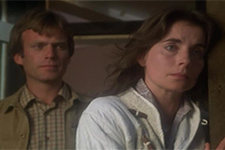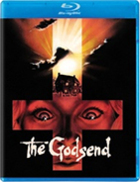The Godsend
|  When it was reviewed during its theatrical release in 1980, Gabrielle Beaumont’s The Godsend was more often than not compared to or described as a rip-off of The Omen (1976). Given the film’s depiction of a seemingly supernatural evil child surrounded by death who is suspected only by her adoptive father, there is some justification in the comparison; however, it should be noted that the film was based on a novel by Bernard Taylor that was published the same year as The Omen was released, thus making any direct inspiration, at least at a story level, all but impossible. More importantly, though, the emotional core of The Godsend is decidedly different, as it uses the evil child narrative (itself an old, old trope in the horror genre) as a means to dramatize a fracturing marriage and how the dynamic between a husband, wife, and demanding child can lead to all manner of emotional turmoil. Outside of cult-horror circles, The Godsend is something of a forgotten film today, having slipped through the cracks since its successful theatrical release in early 1980 by the Cannon Group, which at the time was known for a wide, eclectic mix of independent features. Cannon’s founders, Dennis Friedland and Chris Dewey, had sold it in 1979 to Israel cousins Menahem Golan and Yoram Globus, who would soon shift its focus to martial arts movies, teen sex comedies, and low-budget action vehicles starring Chuck Norris and Charles Bronson. However, in the early 1980s it released a wide slate of horror films, including Schizoid (1980), which played on a double-bill with The Godsend during its 1981 UK release; New Year’s Evil (1980); Death House (1981), which was actually a re-release of a little-known 1972 slasher film originally titled Silent Night, Bloody Night; and Hospital Massacre (aka, X-Ray, 1981). Unlike those films, The Godsend is much more low-key—really more of a marital drama than an overt horror film—and even though there are multiple deaths in the film, all of which are of children, virtually everything takes place off-screen, making the film an intriguing exercise in how horror can grow through the planting of ideas, rather than the explicit depiction of all things gory and grotesque. The story begins with the happy Marlowe family, which consists of a father, mother, and four young children, enjoying a day out in the countryside near the small village where they live in rural England. The father, Alan (Malcolm Stoddard), sees his wife, Kate (Cyde Hayman), speaking with a young, placidly smiling pregnant woman (Angela Pleasence) who has a particularly intense stare that vaguely unsettles him. Kate ends up inviting this strange woman back to their cottage, where she responds to all questions with vague generalities that give no real information about who she is and where she lives. At the end of the night, she goes into labor and gives birth to a girl in their guest bedroom. Alan and Kate allow her to stay the night, but the next morning she has vanished, leaving the newborn child behind. The Marlowes try to figure out the woman’s identity, but it is to no avail, and they end up adopting the baby. That turns out to be an enormous mistake, as one by one their own children die in ways that appear to be entirely accidental. However, each time the adopted daughter, who they name Bonnie, is somewhere in the vicinity, lending credence to the otherwise absurd idea that she is behind all the deaths. As the family gets smaller and smaller, Bonnie becomes more and more demanding of Kate’s time and attention, which pushes Alan to the margins physically and emotionally. Although Alan is initially depicted as a reserved man of little emotional display, Malcolm Stoddard’s performance expands as the film moves forward, opening up into a portrait of an increasingly desperate husband and father who has lost almost all of his children and is danger of losing his wife, as well. While Kate’s initial response to her children’s deaths is somewhat muted, it becomes clear that the mounting toll of so much loss is crushing her psychologically and spiritually, and she reaches to Bonnie for solace, which only makes the situation worse. By the end, lines have been drawn with Bonnie, the human cuckoo with a shock of white-blonde hair who has crushed all the other eggs, and Kate, who is in complete denial, on one side and Alan alone on the other, desperately trying to protect his one living daughter and looking all the more insane for its each day. The Godsend was the lone theatrical feature directed by Gabrielle Beaumont, who otherwise enjoyed a long and prolific career directing a wide array of television series and made-for-television movies in the 1970s, ’80s, and ’90s. Her work in television shows in The Godsend, which often feels like a small-screen Movie of the Week. However, the film’s visual limitations do not constrain its emotional contours, which are more effective than you might expect, especially if you are looking for a lazy Omen knock-off (Wilhelmina Green, who plays Bonnie as an older child, does have an uncanny resemblance, especially in the eyes, to Harvey Stephens, who played young Damien). The screenplay, which closely follows Bernard Taylor’s novel, was written by Olaf Pooley, who was best known as a prolific actor who spent most of his career working in British television, but had penned a pair of low-budget films in the early 1970s, both of which were produced by Beaumont: The Johnstown Monster (1971), which Pooley also directed, and Crucible of Horror (1971). His and Beaumont’s interest is clearly in the interpersonal drama, which is why any sense of supernatural horror is largely downplayed and left tantalizingly ambiguous (today’s horror screenwriters who feel the need to explain every facet of their monsters should take note). The film doesn’t plow any new territory, but it does what it does with a steady tenacity that builds with admirable tension, leaving us with a simple, yet profoundly unsettling—one might even say nihilistic—final image that makes clear the terrible circularity of horror.
Copyright © 2025 James Kendrick Thoughts? E-mail James Kendrick All images copyright © Kino Lorber | |||||||||||||||||||||||||||||
Overall Rating: 

 (3)
(3)


